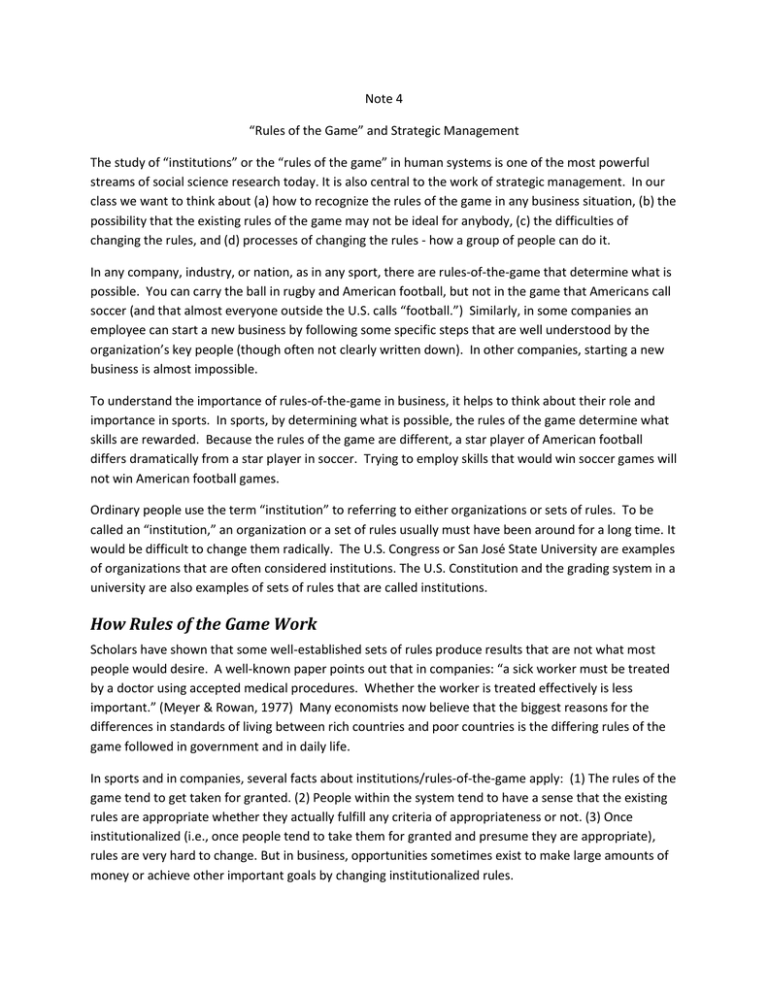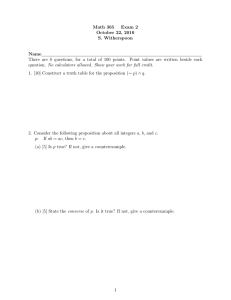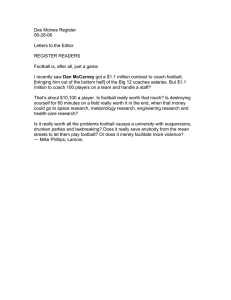Note 4 “Rules of the Game” and Strategic Management
advertisement

Note 4 “Rules of the Game” and Strategic Management The study of “institutions” or the “rules of the game” in human systems is one of the most powerful streams of social science research today. It is also central to the work of strategic management. In our class we want to think about (a) how to recognize the rules of the game in any business situation, (b) the possibility that the existing rules of the game may not be ideal for anybody, (c) the difficulties of changing the rules, and (d) processes of changing the rules - how a group of people can do it. In any company, industry, or nation, as in any sport, there are rules-of-the-game that determine what is possible. You can carry the ball in rugby and American football, but not in the game that Americans call soccer (and that almost everyone outside the U.S. calls “football.”) Similarly, in some companies an employee can start a new business by following some specific steps that are well understood by the organization’s key people (though often not clearly written down). In other companies, starting a new business is almost impossible. To understand the importance of rules-of-the-game in business, it helps to think about their role and importance in sports. In sports, by determining what is possible, the rules of the game determine what skills are rewarded. Because the rules of the game are different, a star player of American football differs dramatically from a star player in soccer. Trying to employ skills that would win soccer games will not win American football games. Ordinary people use the term “institution” to referring to either organizations or sets of rules. To be called an “institution,” an organization or a set of rules usually must have been around for a long time. It would be difficult to change them radically. The U.S. Congress or San José State University are examples of organizations that are often considered institutions. The U.S. Constitution and the grading system in a university are also examples of sets of rules that are called institutions. How Rules of the Game Work Scholars have shown that some well-established sets of rules produce results that are not what most people would desire. A well-known paper points out that in companies: “a sick worker must be treated by a doctor using accepted medical procedures. Whether the worker is treated effectively is less important.” (Meyer & Rowan, 1977) Many economists now believe that the biggest reasons for the differences in standards of living between rich countries and poor countries is the differing rules of the game followed in government and in daily life. In sports and in companies, several facts about institutions/rules-of-the-game apply: (1) The rules of the game tend to get taken for granted. (2) People within the system tend to have a sense that the existing rules are appropriate whether they actually fulfill any criteria of appropriateness or not. (3) Once institutionalized (i.e., once people tend to take them for granted and presume they are appropriate), rules are very hard to change. But in business, opportunities sometimes exist to make large amounts of money or achieve other important goals by changing institutionalized rules. Because it is difficult to change rules-of-the-game, companies and other organizations usually possess a great deal of inertia. That is, they tend to continue doing what they have been doing. Often this is good. If an auto dealer has been providing good quality repairs for a long time, there will be a taken-forgranted ways of working that encourage it to continue doing so. But frequently inertia is disastrous. Companies continue doing what they have always done even though it is obvious that competition has made those ways obsolete. These facts make understanding institutions/rules of the game very important. To accomplish anything in a human system, it is important to understand the rules of the game there. Many of these will not be written down, and at least some will be illogical to newcomers. Because they are taken for granted, people will have difficulty explaining them. Take time to think about what the rules of your particular system are. Changing the Rules of a Game Often the newcomer who feels that the rules in a system are illogical is right. A system may perform much worse than it could because its institutions aren’t optimal. But changing institutions is difficult because people in the system accept them and because people constantly rely on them in their daily activities. If the newcomer who sees the illogic is a powerful executive and he or she simply announces some new rules, it is likely that many people will not follow them. There are many approaches to changing institutions. However, generally it helps a lot if people believe there is some kind of crisis. Then the group advocating change has to bring a large share of the organization (a “center” or “core”) to belief that some new way of doing things is desirable or necessary. Often some organizations must change their rules-of-the-game or they will go out of business. Reference Meyer, J. W., & Rowan, B. (1991). Institutionalized organizations: Formal structure as myth and ceremony. In P. J. DiMaggio & W. W. Powell (eds), The new institutionalism in organizations (pp. 108–140). Chicago: University of Chicago Press. (Original work published 1977) Robert Chapman Wood San José State University Robert.wood@sjsu.edu ©2008, 2014, Robert Chapman Wood Please request permission if interested in reproducing in whole or in part.

